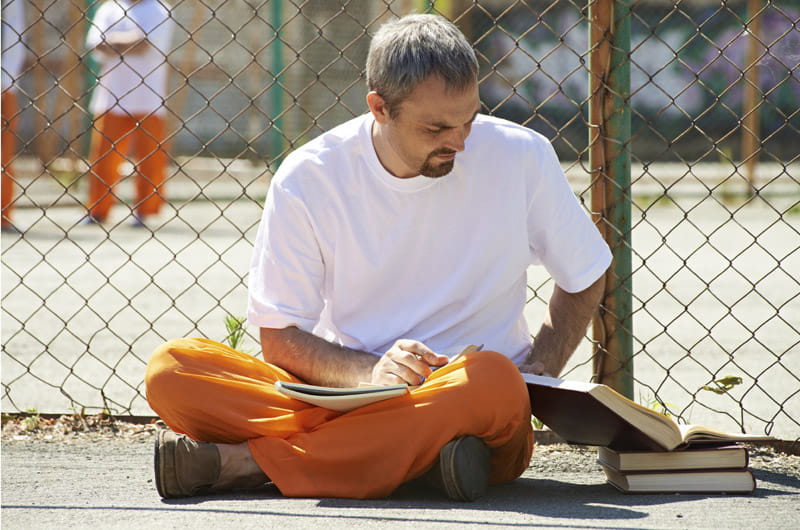Prison Reading Project Opens Minds on Both Sides of the Bars

- No link between acetaminophen use during pregnancy and children's autism risk
- Ribbon-Cutting Ceremony Marks Official Unveiling of Drexel Station at 30th Street
- Drexel Recognizes Gregory E. Deavens, CPA, CGMA as Business Leader of the Year
- Through Connections and Community, Drexel Course Helps Launch Computer Lab in Tanzania

It all started with an opinion piece in the Wall Street Journal last Christmas. A reading regimen of classic literature for just 15-minutes a day could have an enriching and inspiring impact, wrote Paula Marantz Cohen, PhD, dean of Drexel University’s Pennoni Honors College and distinguished professor of English in the College of Arts and Sciences.
A few months after the piece was published, Cohen received a handwritten letter in the mail. The author, Richard Guy, wrote that reading classic novels and philosophy texts had been vital to his self-education.
It was where Guy was reading the Harvard Classics that Cohen found particularly striking: a cell in State Correctional Institution-Fayette, a maximum-security prison outside of Pittsburgh. Guy was serving a life sentence for a crime he committed in a drug-induced stupor in his 20s; he had been incarcerated for 32 years.
During his time in prison, Guy graduated cum laude with a degree in psychology from the University of Pittsburgh. But, according to Guy, the prison's educational programming had been scaled back. He thought that a reading project – based on the Harvard Classics – would help fill the gap. Would Cohen help?
So, with the approval of the state prison system and the help of Julia Hall, PhD, a professor in Drexel’s Department of Criminology and Justice Studies in the College of Arts and Sciences, the Prison Reading Project began. Offered as an honors colloquium, the course was co-taught by Cohen and Raymond Brebach, PhD, an associate professor of English. The fall-term course, open to honors students of any year or discipline across the university, was comprised of eight students and 25 inmates.
Each week, students selected short readings – approximately 15-minutes of reading each – and constructed an introduction to the work and discussion questions for the inmates, who would complete the reading and questions and send back their handwritten responses. The students would then provide feedback to the inmates, creating a dialogue between the two groups.
Although no names or identifying details were used due to security protocol, the classmates learned about each other solely through their writing.
The students selected an eclectic mix of texts, from short stories to non-fiction and news articles, and they were stunned by the responses.
"It was utterly fascinating to watch the students engage in this interaction with a group of inmates," said Brebach. "I think they were surprised at how seriously 'the guys' in Fayette State took to the task of reading and responding to the readings we sent. And we were all surprised at the thoughtful, articulate, honest responses coming back from the prison."
Cohen agreed. “The inmates’ reactions were so thoughtful, eloquent and well-written,” she said. “The wide-ranging readings required a higher-level thinking than the vocational training that the inmates were accustomed to. Reading broadens the way of thinking, which is what a liberal education does. The students said that this course was a revelation to them; they never thought that writing about literature could have so much real-world impact.”
Steven Blumberg, a sophomore and a double major in marketing and management information systems, found the class to be beneficial on several levels. It improved his reading, writing and critical thinking, and deepened his appreciation for the liberal arts and humanities, but it also highlighted the disparity between his situation in life and those of the inmates.
“The responses to the readings reminded me of a Henry James quote that Dr. Cohen introduced to us: ‘Deep experience is never peaceful,’” said Blumberg. “The simple articles about business or current events brought out flat responses; however, passages that made you think and interrupted your personal peace led to deep responses that I especially enjoyed.”
One of the readings Blumberg selected was from a fable called “Jonathan Livingston Seagull” by Richard Bach. “In many of the responses to the fable, the men talked about how the bird, which sought isolation and became happy, was a ‘false story’ by the writer,” said Blumberg. “These men have been in isolation for years and know that true happiness for them was in society, not in isolation. That really stuck out to me.”
Another reading that resonated with the inmates was “Man’s Search for Meaning,” Victor Frankl’s memoir about his life in a concentration camp.
“I did ten straight years in solitary confinement,” wrote one inmate. “I saw many of the people around me go stark raving mad. I watched them break and become animals, I watched them kill themselves and watched them get medicated into the walking dead.”
Senior communications major Larissa Bundziak found that, while each reading generated very powerful responses, it was a response to Annie Dillard’s essay, “The Death of a Moth,” that she found particularly striking.
“One inmate responded to the essay, which depicts how appreciating the mundane can lead to magical results, proclaiming his appreciation for the piece and explaining how he took the mundane aspects of his life – the way his wife held her cup of coffee, the way a hug from his children felt – for granted before his incarceration,” said Bundziak. The course, she said, gave her a new appreciation for the power of reading.
Matt Denshaw, a senior biomedical engineering major, called the class one of the best experiences of his undergraduate education. “Seeing how much reading and education mattered to this group of inmates allowed me to see that I was taking some things for granted,” said Denshaw. “Education should be treasured… and it doesn't have to be confined to a classroom.”
Denshaw submitted a selection from “To Kill a Mockingbird” to the inmates. “Despite coming face-to-face with a book riddled with racism and wrongdoing, the inmates stressed tolerance and ‘not having the right to judge anyone,’” said Denshaw. “If more people felt that way, and practiced what they preached, then the world would be a much better place. It opened my eyes and pushed me to re-evaluate some of my thoughts and beliefs.”
Lauren Lowe, a junior English major, wrote on the Drexel Publishing Group’s “5027mac” blog that this class – and other non-traditional classes at Drexel – have been some of the most unique and enriching academic experiences of her college career. “To be able to read in different ways opens up the world, I think, which then allows us to interact with that world in new and different ways,” she wrote.
“This was truly a life-changing experience,” said Cohen. “Through this epistolary correspondence, students came to see the inmates so poignantly as human beings. The responses were so illuminating that each inmate took on a composite life of their own. It humanized the inmates to such a degree that I think many of the students now have a different attitude toward the prison system.”
Efforts are underway to continue the program and to create materials so that the course can be replicated elsewhere
In This Article
Contact
Drexel News is produced by
University Marketing and Communications.